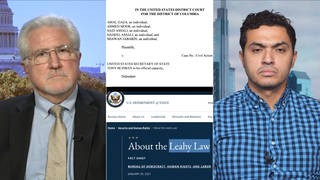
Guests
- Jonathan Hafetzassociate counsel of the Liberty & National Security Project at the Brennan Center for Justice at NYU School of Law.
The Bush administration has declared Ali al-Marri an “enemy combatant” and is claiming the right to jail him forever without pressing charges. On Thursday, al-Marri’s attorneys appeared in a federal court to fight his five-year detention. The case marks one of the first challenges of the Military Commissions Act and its suspension of the writ of habeas corpus. Constitutional scholars warn that if the government prevails, it would expose more than 20 million noncitizens residing in the United States to the risk of indefinite detention on the basis of unfounded rumors, mistaken identity and lies. [includes rush transcript]
Transcript
AMY GOODMAN: We look at the case of Ali al-Marri. Over five years ago, he was arrested at his home in Peoria, Illinois, where he lived with his wife and five children. He was initially arrested on criminal charges on suspicion of being part of a sleeper al-Qaeda cell. But in June 2003, President Bush declared him to be an enemy combatant. The criminal charges were dropped. He was handed over to the military. He has been held in solitary confinement ever since in a Navy brig in South Carolina. He’s the only person still being held as an enemy combatant on U.S. soil.
Al-Marri has not been charged with any crime. Evidence has never been presented. And the Bush administration is claiming the right to jail him forever without pressing charges. On Thursday, al-Marri’s attorneys appeared in a federal court in Richmond, Virginia, to fight his detention. The case marks one of the first challenges of the Military Commissions Act and its suspension of the writ of habeas corpus.
Two months ago, 30 constitutional scholars filed a brief about al-Marri’s case. They warned, if the government prevails, it would expose more than 20 million noncitizens residing in the United States to the risk of indefinite detention on the basis of unfounded rumors, mistaken identity and lies.
Here with me now is one of al-Marri’s attorneys, Jonathan Hafetz, an attorney with the Brennan Center for Justice here in New York City. Welcome to Democracy Now!
JONATHAN HAFETZ: Good morning.
AMY GOODMAN: So start from the beginning. How was al-Marri picked up?
JONATHAN HAFETZ: Well, he was arrested at his home by FBI agents, charged with a crime, and then, as you pointed out, shortly before trial and actually literally on the eve of a hearing to suppress illegally seized evidence that was taken from his home without a warrant, the government essentially just pulled the plug on the criminal justice system and by the stroke of a pen transferred him to a military brig to legal limbo, where he had no rights, was held incommunicado and has been detained without charges now for going on four years.
AMY GOODMAN: What is this brig where he is held?
JONATHAN HAFETZ: The brig is a military prison in South Carolina. It typically houses individuals from the military who are convicted, court-martialed for offenses. But he’s in a isolated wing of the brig. He’s never seen another prisoner. The only individuals he’s permitted to see are his captors, the military guards, and now his lawyers are able to see him, but the first 17 months he was held completely incommunicado. His lawyers were not able to contact him. We had no contact with him.
AMY GOODMAN: For how long?
JONATHAN HAFETZ: For 17 months.
AMY GOODMAN: For almost a year and a half.
JONATHAN HAFETZ: That’s correct. Even the International Committee for the Red Cross was not able to go in. I mean, it was essentially secret detention on U.S. soil. We had no way of knowing if he was alive.
AMY GOODMAN: And what exactly was the charge?
JONATHAN HAFETZ: Well, there was no charge. There were just allegations made, hearsay allegations, allegations we believe that were obtained from detainees through illegal methods, other detainees possibly through torture that the government did not present in court. There has been no hearing, no witnesses, nothing that would resemble what we understand as due process.
AMY GOODMAN: And explain what you mean when on the eve of — you’re saying on the eve of trial?
JONATHAN HAFETZ: Well, the trial was a few weeks away, but the judge had scheduled a hearing to suppress illegally seized evidence. The government can’t present evidence at a trial that’s been taken from someone’s home without a warrant. And there was a hearing to find out whether that had happened, and instead of going forward with the hearing, as would normally happen, the government showed up with an order, a one-page order from the president saying, “You’re an enemy combatant. We’re going to dismiss the criminal case, and we’re going to snatch Mr. al-Marri and put him in a brig.”
AMY GOODMAN: And what does “enemy combatant” mean, that he had been fighting on the battlefield?
JONATHAN HAFETZ: Well, the term “enemy combatant” means essentially whatever the government says it means. They’ve used different definitions in different cases.
AMY GOODMAN: Invented by this administration?
JONATHAN HAFETZ: Yeah. The concept of enemy combatant is not a concept that’s identified under the laws of war. The government claims it’s a customary use of the laws of war or, you know, law of armed conflict, but there is no such thing as enemy combatant as the administration’s used its term. The way they use it is they try to describe it as someone who’s fighting on a battlefield. But Mr. al-Marri was never on a battlefield, never fought against U.S. troops. He’s not in any way what we understand to be a combatant under the laws of war. He is essentially an alleged criminal who should be tried in the criminal justice system and has a right to be tried, but they are inventing this term to try to kind of pull the rug from under those rights and essentially get out of the Bill of Rights.
AMY GOODMAN: And so, he’s held in the military brig for how long?
JONATHAN HAFETZ: Well, he’s been at the brig now for over three-and-a-half years.
AMY GOODMAN: And how does this fit into the Military Commissions Act?
JONATHAN HAFETZ: Well, while his case was on appeal, Congress passed the Military Commissions Act in October, last October, and what the government has come to court claiming is that the Military Commissions Act strips the courts of the power even to hear his habeas corpus case. So if the government’s correct, the court would not even have the power to decide whether his detention is lawful. You know, we submit that that was never Congress’s intention. It never suspended the writ of habeas corpus, and so it could never eliminate the right of habeas corpus for any of the lawful resident aliens in the United States who have constitutional rights just like American citizens. And if they did, it would be unconstitutional. Congress could not take away the court’s power to hear his habeas case.
AMY GOODMAN: Janet Reno, the former attorney general, has commented on this case. What has she said?
JONATHAN HAFETZ: Well, what she said, I think, is very important, which is she and other top law enforcement officials who have spent their careers prosecuting crimes, including alleged terrorist crimes, and they say, you know, look, the nation’s criminal laws are very strong and are sufficient to handle the prosecution of terrorism cases, and we’ve seen that before 9/11, and we’ve seen it after. The government has prosecuted and obtained numerous convictions of individuals alleged of things that are similar to what is alleged against Mr. al-Marri. And what we’re asking for is that same right, that same core right of our Constitution, to be able to contest the charges and prove his innocence at a criminal trial.
AMY GOODMAN: So what does this mean for other noncitizens in the United States?
JONATHAN HAFETZ: Well, it’s, I think, very terrifying what it could mean. It means, one, if the government is correct about the Military Commissions Act, any immigrant could be snatched off the streets and secretly jailed, potentially forever, in a military brig, without ever having the right to get the court on a habeas corpus petition to ever have a right to receive judicial review of whether their detention is unlawful. And it means that individuals could be held potentially forever without charge. And it’s important to know that the powers the government is asserting to hold Mr. al-Marri as an enemy combatant are the same powers they say they can hold a U.S. citizen. They’ve made clear that if everything were the same and Mr. al-Marri were a U.S. citizen, they could do exactly the same thing. So what can happen to him could happen to a U.S. citizen. It happened to Jose Padilla, as we know. And, I mean, this is it. They are essentially crossing the rubicon. They are essentially saying, “We don’t have to follow the criminal justice system and the Bill of Rights if we deem someone an enemy combatant.”
AMY GOODMAN: So what happens now in al-Marri’s case?
JONATHAN HAFETZ: Well, we will wait for the Fourth Circuit’s decision in his appeal.
AMY GOODMAN: And he remains in the brig?
JONATHAN HAFETZ: Yeah, he remains in the brig, pending a decision.
AMY GOODMAN: And the Congress, Senate, passing the Military Commissions Act, stripping habeas corpus?
JONATHAN HAFETZ: Well, the court will decide whether Congress in fact stripped habeas corpus over his case, and if it did, it will address whether or not it’s constitutional. So the court will address that issue in its decision.
AMY GOODMAN: Have you met with al-Marri?
JONATHAN HAFETZ: Yes, a number of times.
AMY GOODMAN: What is his mental condition?
JONATHAN HAFETZ: Well, I think it’s fluctuated over time. You know, at times it’s been very bad. I mean, there was a period of time when he was held in — you know, the isolation and the deprivation of basic necessities, basic religious items that didn’t allow him to practice Islam. Things like, you know, that we take for granted, like soap and toilet paper, were not given to him. And there was a period of time where he felt like he was losing his mind. He’s now in more stable condition. Things have improved, you know, largely because we filed a lawsuit against the government to compel them to treat him humanely. But he has, I think, been harmed very significantly, physically and mentally, by this ordeal, but, you know, he’s trying to hold it together and to main faith that he’ll have, you know, the right to a fair hearing in court one day.
AMY GOODMAN: And what about his family, his wife and his kids?
JONATHAN HAFETZ: Well, it’s difficult. His youngest child, for example, he last saw when the child was nine months old; now over five, has not seen them. He’s not allowed to talk to them on the phone. No visits. All he’s allowed to communicate through is letters, but because of the government censorship, they take sometimes 10 months to reach his family or his family’s letters to reach him. And they’re sometimes very redacted. They will black out, you know, three-quarters of a letter from a seven-year-old child. So it’s really inconceivable that he’s not allowed to have meaningful contact with his own family.
AMY GOODMAN: And under what circumstances do you see him? What is the physical space like? What condition is he in?
JONATHAN HAFETZ: Well, now where we see him it varies. I mean, we’re able to sit across from him. He’s now not restrained. He used to have a leg shackle, ankle shackle on. But we’re able to meet with him now, and the staff at the brig have been very professional and accommodating in handling these requests. And, you know, the problem is not with the folks at the brig, the military people; the problem is with the administration and the three stars, as it were, who set this kind of policy, where you can hold someone as an enemy combatant and not give him any of the protections that we give prisoners during wartime.
AMY GOODMAN: Jonathan Hafetz, I want to thank you very much for being with us. He’s associate counsel of the Liberty & National Security Project at the Brennan Center for Justice at New York University School of Law. Thank you.
JONATHAN HAFETZ: Thank you.













Media Options